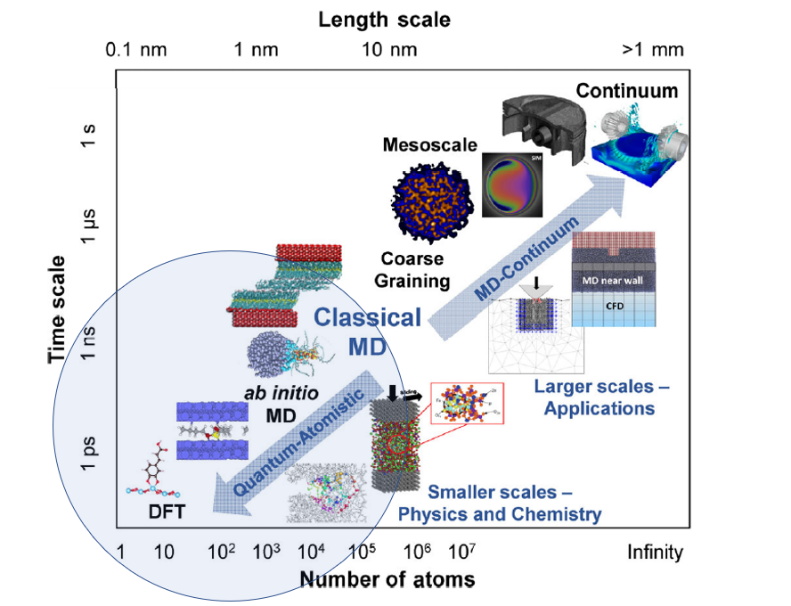Nanoscale simulations of lubricants and lubricant additives?
Nanoscale simulations of lubricants and lubricant additives?
Promotor(en): D. Fauconnier, T. Verstraelen /20MODEV14 / Model and software developmentProblem Context
 The rising demand to reduce energy consumption and increase efficiency in engineering systems requires a deep understanding of lubricant behaviour to reduce friction. Understanding the interaction between engine components and lubricant molecules at atomistic-level is very crucial to gain an insight on preventing the energy loss in the machine components. Since this understanding presents challenges in the experimental point of view, computer simulations are widely preferred to develop an interpretation for this type of tribological problems in recent decades. Quantum Mechanical (QM) techniques, such as Density Functional Theory (DFT), are very effective way to study atomistic behaviour of variety of systems and have been extensively used to investigate the interaction of lubricant molecules with solid surfaces as well as lubricant additives such as organic friction modifiers (OFMs) and anti-wear additives. However, these techniques are static and they require huge computational cost. Also, system sizes are limited to maximum ≈102 atoms.
The rising demand to reduce energy consumption and increase efficiency in engineering systems requires a deep understanding of lubricant behaviour to reduce friction. Understanding the interaction between engine components and lubricant molecules at atomistic-level is very crucial to gain an insight on preventing the energy loss in the machine components. Since this understanding presents challenges in the experimental point of view, computer simulations are widely preferred to develop an interpretation for this type of tribological problems in recent decades. Quantum Mechanical (QM) techniques, such as Density Functional Theory (DFT), are very effective way to study atomistic behaviour of variety of systems and have been extensively used to investigate the interaction of lubricant molecules with solid surfaces as well as lubricant additives such as organic friction modifiers (OFMs) and anti-wear additives. However, these techniques are static and they require huge computational cost. Also, system sizes are limited to maximum ≈102 atoms.
Molecular Dynamics (MD) is a promising technique to study larger systems with desired temperature/pressure effects. In addition, with the help of reactive force-fields (such as ReaxFF), reactivity of lubricant additives can be studied.
Hence, both DFT and MD techniques are powerful tools to develop bottom-up understanding for tribological systems and can be effectively used to design lubricants to reduce friction and energy consumption in the machine components.
Thesis Objectives
The main purpose of this study is to investigate the nature of interaction between solid walls and the lubricants using Density Functional Theory (DFT) and Molecular Dynamics (MD) simulation techniques. We would like to focus on some properties of single-molecule lubricants (i.e. alkanes CnH2n+2) and solid surfaces (such as iron(III) oxide to better represent engine components that are generally made up of steel), as well as lubricant additives (such as organic friction modifiers (OFMs) or anti-wear additives), in order to gain more physical insight on their nature of interaction at atomistic level. These properties include,
- Adsorption characteristics of different single-molecule lubricants on solid surfaces
- Calculation of friction coefficient
- Effect of lubricant additives on adsorption characteristics and friction coefficient
For investigation of adsorption characteristics at DFT level, we intend to use Quantum Espresso code with dispersion corrections (i.e. DFT-D3) to better modelling of long range interactions and the well-established open-source LAMMPS code for MD calculations.
- Study programmeMaster of Science in Engineering Physics [EMPHYS], Master of Science in Electromechanical Engineering [EMELME], Master of Science in Physics and Astronomy [CMFYST]KeywordsLubricants, Nanotribology, Tribochemistry, Density functional theory, Molecular dynamics simulations

